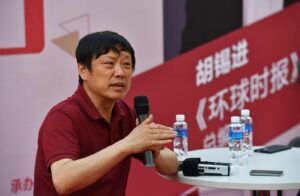On December 16, 2021, Hu Xijin, editor-in-chief of the Chinese media Global Times, posted on his personal Weibo account that “Old Hu will be 62 years old in the coming year, and it’s time for him to retire. I have gone through retirement procedures and will no longer be the editor-in-chief of the Global Times.”
This statement confirms the recent rumors about Hu Xijin’s imminent retirement. The early leak of the news and the public debate it has generated reflect the strong interest in Hu Xijin and the huge influence he has in the Chinese public opinion arena.
Hu Xijin was born in April 1960 and is indeed in his 60s. It is not easy for him to keep writing on the front lines of Chinese public opinion for years at such an advanced age. However, his spirit still looks good, plus his full head of black hair, claiming 300 push-ups a day, it seems that his physical condition is still satisfied to continue to serve in office.
However, he confessed on his Weibo account that he was “62 years old after the turn of the year, when it’s time to retire”, meaning perhaps that the main reason for his job move was the age factor. Hu Xijin’s successor is said to be Fan Zhengwei, a “post-80s” editor-in-chief and member of the commentary department of People’s Daily, who is more than 20 years younger than Hu Xijin.
Hu’s career has been inextricably linked to the Global Times. He has been the deputy editor-in-chief of the paper since October 1997 and the editor-in-chief since September 2005. Hu Xijin has been a key figure in the growth of the Global Times from a little-known newspaper in the media camp of the People’s Daily to one of the most well-known media outlets in China’s international coverage today.
It is worth mentioning that in February 2016, when Chinese President Xi Jinping was investigating the three central media outlets, People’s Daily, Xinhua News Agency and CCTV, the only live voice-over that CCTV has purposely kept can be clearly heard when Chinese President Xi Jinping pointed to a copy of Global Times on stage and said, “I also have this newspaper there.”
The Global Times has become a front for China’s foreign propaganda in the face of some Western media reports that are less knowledgeable about China and even arrogant and biased. It can be found that the Global Times is the most frequently featured Chinese newspaper in the China-related coverage of the New York Times and other international media, although it is often derogatorily referred to as a “nationalist tabloid”.
Hu Xijin can be considered the soul of the Global Times. He and the Global Times complement each other, and the Global Times is deeply imprinted with Hu Xijin’s style. Hu Xijin often published commentaries in the Global Times under the pseudonym “Shan Renping.” According to him, many of the newspaper’s editorials are based on Hu Xijin’s oral statements.
In the Internet era, Hu Xijin has also expanded his Weibo, WeChat and Twitter platforms based on the Global Times, and his influence cannot be underestimated. For example, Hu Xijin’s Weibo has more than 24 million followers and is updated so frequently that he hardly misses a hot public opinion event in China or abroad.
Both Hu Xijin and the Global Times have shown a distinctive stance and a way of expressing themselves that has often led them into huge public controversies.
In the overall environment of tightening public opinion management in China in recent years, Hu Xijin has been partially praised for often not shying away from sensitive topics and often calling for more room for media coverage.
Hu Xijin is known for his “complex China” argument, for which he wrote a book, “Hu Xijin on Complex China”. His personal Weibo profile also reads “Hu Xijin, a ‘complex China’ reporter.”
But because of this so-called “complex China” understanding, Hu Xijin has often been criticized for being a “muddler” and a “wall-rider”, not pleasing to the eye.
Regardless, Hu Xijin can be considered a “pen” of Chinese propaganda, an observer, defender, analyst and chronicler of the development of China’s history, and able to influence the views of many Chinese people on events.
After Hu Xijin steps down as editor-in-chief of the Global Times, there may no longer be an “opinion leader” in the Chinese media. His personal influence will inevitably diminish as he continues to age. But this will probably continue for a few more years.
Hu Xijin also mentioned in his Weibo post, “I will continue to contribute to the development of the Global Times as a special commentator, and continue to do my best for the Party’s public opinion work.” Source
